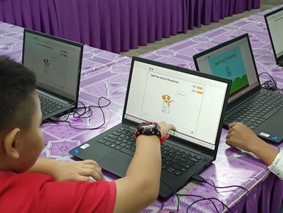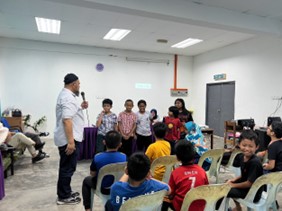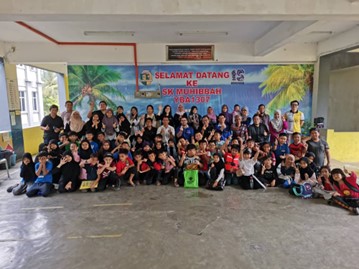In the heart of vibrant communities lies a hidden gem–the invaluable impact of teaching tuition at primary schools.
As we delve into the essence of education, discover the transformative power of providing essential support to young minds, nurturing their potential for a brighter tomorrow.
Let’s dive into SK Muhibbah, a school located in Kuching’s rural area, where extra help isn’t just a luxury but a necessity, paving the way for brighter academic journeys for students.
In the span of six months, from May 2023 till November 2023, UNIMAS has rolled out an exciting tuition program at SK Muhibbah to uplift the community’s education that is designed to empower young minds and elevate primary education through funding from Yayasan Hasanah.
The initiative titled “Improving Science, Math and Technology among primary 3, 4, and 5 students at Kampung Muhibbah and Kampung Pinggan Jaya using Game-Based Learning” is crafted to assist children from economically disadvantaged backgrounds in Kampung Muhibbah and Kampung Pinggan Jaya.
This program provides specialised tuition in Science, Math, and Technology, addressing the educational setbacks these children faced due to the pandemic.
From the informal discussion, some kids lose motivation to study and lose interest in science, math and technology subjects. As education is important for the community, there is a call for their parents to support the kids so that they can further their studies in high school and university.
To them, education is the way to reduce poverty. Hence, this project is important to study the difficulty among the kids in learning Math, Science and Technology; propose customized learning modules to the kids; support the kids learning on Science, Math and technology through tuition and ICT bootcamp; and assess the kids’ performance.

In this program, learning English, Science and Math is not confined to traditional methods.
The team headed by Dr Cheah Wai Shiang from Faculty of Computer Science and Information Technology (FCSIT), UNIMAS understands that education goes beyond textbooks, hence the tuition program employs interactive learning methods, ensuring that students actively participate in their learning journey.
This approach fosters critical thinking, collaboration, and creativity, preparing students for a dynamic future. The tuition program has embraced the power of technology with computer-based learning activities.
Students were engaged in interactive sessions, immersing themselves in digital platforms designed to enhance their English language skills. This modern approach ensures that learning is not only effective but also enjoyable.

AP Dr. Mohammad Ibrahim Safawi, UNIMAS Engineering lecturer, giving a talk to SK Muhibbah students during the tuition program
As the curtains draw on SK Muhibbah’s tuition program, it’s clear that the seeds of change have been sown. In these six months, a remarkable transformation has taken place.
Under the guidance of Dr. Cheah Wai Shiang and his team, the school has moved beyond traditional teaching methods, incorporating technology and interactive approaches to enhance student engagement and learning outcomes.
This approach, which includes computer-based activities and digital games, makes learning more effective and enjoyable for the students. The program’s success is evident in students’ increased interest and participation in classes, particularly in Science, Math, and English.

The transformation seen in these young learners their growing curiosity, willingness to ask questions, and active participation reflects the importance of such educational initiatives.
These efforts are not just about imparting knowledge but also about empowering these young minds to use education to improve their prospects and, by extension, the well-being of their community.
This journey at SK Muhibbah is more than just an educational endeavor; it’s a beacon of hope, illuminating the path toward a brighter, more equitable future for all.
Written by: Nur Zulaikha Nadhirah Adi, Nur Syafeeza Aquira Adi, Cheah Wai Shiang, Nurfauza Jali
Edited by: Hamizan Sharbini